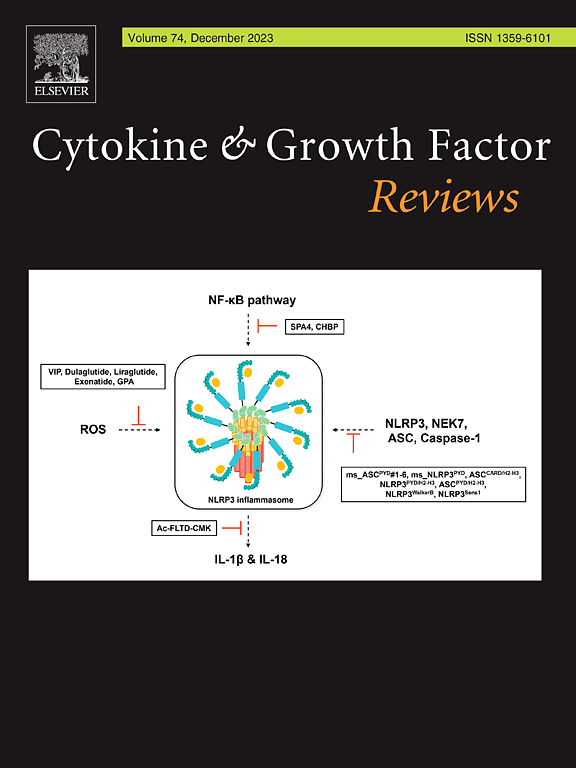The intersection of microbiome and autoimmunity in long COVID-19: Current insights and future directions
IF 11.8
2区 医学
Q1 BIOCHEMISTRY & MOLECULAR BIOLOGY
引用次数: 0
Abstract
Long COVID-19 affects a significant percentage of patients and is characterized by a wide range of symptoms, including weariness and mental fog as well as emotional symptoms like worry and sadness. COVID-19 is closely linked to the autoimmune disorders that are becoming more prevalent worldwide and are linked to immune system hyperactivation, neutrophil extracellular trap (NET) development, and molecular mimicry pathways. Long-term COVID-related autoimmune responses include a watchful immune system referring to the ability of immune system to constantly monitor the body for signs of infection, disease, or abnormal cells; altered innate and adaptive immune cells, autoantigens secreted by living or dead neutrophils, and high concentrations of autoantibodies directed against different proteins. The microbiome, which consists of billions of bacteria living in the human body, is essential for controlling immune responses and supporting overall health. The microbiome can affect the course of long COVID-associated autoimmunity, including the degree of illness, the rate of recovery, and the onset of autoimmune reactions. Although the precise role of the microbiome in long COVID autoimmunity is still being investigated, new studies indicate that probiotics, prebiotics, and dietary changes—interventions that target the microbiome—may be able to reduce autoimmune reactions and enhance long-term outcomes for COVID-19 survivors. More research is required to precisely understand how the microbiome affects COVID-19-related autoimmunity and to create tailored treatment plans.
长 COVID-19 微生物组与自身免疫的交叉:当前见解与未来方向
长COVID-19会影响相当一部分患者,并表现出多种症状,包括倦怠、精神错乱以及忧虑和悲伤等情绪症状。COVID-19 与全球日益流行的自身免疫性疾病密切相关,这些疾病与免疫系统过度激活、中性粒细胞胞外捕获器(NET)发育和分子模拟途径有关。与 COVID 相关的长期自身免疫反应包括:警惕性免疫系统,即免疫系统能够不断监测机体是否出现感染、疾病或异常细胞的迹象;先天性和适应性免疫细胞的改变;活的或死的中性粒细胞分泌的自身抗原;以及针对不同蛋白质的高浓度自身抗体。微生物组由生活在人体内的数十亿个细菌组成,对于控制免疫反应和支持整体健康至关重要。微生物组会影响长期 COVID 相关自身免疫的病程,包括患病程度、恢复速度和自身免疫反应的发生。虽然微生物组在长期 COVID 自身免疫中的确切作用仍在研究之中,但新的研究表明,益生菌、益生元和饮食改变--这些针对微生物组的干预措施--可能能够减少自身免疫反应并改善 COVID-19 存活者的长期预后。要准确了解微生物组如何影响与 COVID-19 相关的自身免疫,并制定有针对性的治疗方案,还需要进行更多的研究。
本文章由计算机程序翻译,如有差异,请以英文原文为准。
求助全文
约1分钟内获得全文
求助全文
来源期刊

Cytokine & Growth Factor Reviews
生物-生化与分子生物学
CiteScore
21.10
自引率
1.50%
发文量
61
审稿时长
22 days
期刊介绍:
Cytokine & Growth Factor Reviews is a leading publication that focuses on the dynamic fields of growth factor and cytokine research. Our journal offers a platform for authors to disseminate thought-provoking articles such as critical reviews, state-of-the-art reviews, letters to the editor, and meeting reviews.
We aim to cover important breakthroughs in these rapidly evolving areas, providing valuable insights into the multidisciplinary significance of cytokines and growth factors. Our journal spans various domains including signal transduction, cell growth and differentiation, embryonic development, immunology, tumorigenesis, and clinical medicine.
By publishing cutting-edge research and analysis, we aim to influence the way researchers and experts perceive and understand growth factors and cytokines. We encourage novel expressions of ideas and innovative approaches to organizing content, fostering a stimulating environment for knowledge exchange and scientific advancement.
 求助内容:
求助内容: 应助结果提醒方式:
应助结果提醒方式:


